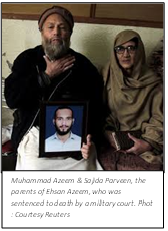
The military courts have surreptitiously been given power to try suspects languishing in interment centers located in the Khyber Pakhtunkhwa Province and the Federally Administered Tribal Areas (FATA). These military courts will now decide the fate of militants declared ‘black’, a term that has not been clearly defined in the Pakistan Army Act, 1952 (PAA).
Post the Peshawar carnage, the military courts were established to try hardened terrorists, as it was feared that the military operation in tribal areas Zarb-e-Azb would not yield results if the captured enemy combatants would be tried in the anti-terrorism court.
The internment centers were established under the Action (in Aid of Civil Power) Regulation, 2011, for FATA and the Provincially Administered Tribal Areas (PATA). The 21st Amendment to the Constitution provides constitutional cover to trial of the offences relating to terrorism by the military courts while an amendment to the PAA has extended the jurisdiction of military courts to try terrorists.
However, the 21st constitutional amendment and the subsequent amendments to the PAA did not provide for the trial of those detained in internment centers. Upon pressure from the civil society and the Supreme Court, to declare a list of those interned at the notorious internment centers, the military has now decided to try the suspects in the military courts, as it does not trust the judicial process to dispense justice is wants dispensed.
By virtue of the Pakistan Protection Act (PPA), waging war against the armed forces has been declared an offence. In January 2015, the jurisdiction of PPA has been extended to the Gilgit-Baltistan through a presidential order. Another amendment to provide for the protection of witnesses, presiding officers, prosecutors, and defending officers of the military courts was also introduced into the Parliament. The Senate has approved it on August 11. This third amendment, which was made on the quiet, now allows the trial of those held at internment centres.
Federal Minister for Information and Broadcasting Pervaiz Rashid has said that the ordinance was issued at a time when the National Assembly was not in session. He said the matter was also pending before the Supreme Court and that was why the government did not introduce it in the shape of a bill in the Parliament.
“Now the Supreme Court has dismissed petitions against the 21st constitutional amendment and the government will table this matter before the parliament,” stated the Minister, as quoted in a recent article in Dawn newspaper, adding that “the ordinance would be tabled in the shape of a bill before the parliament; if it is not, it would lapse accordingly.”
On 5 August 2015, the apex court validated and upheld the establishment of the military court, paving the way for what many experts term as the “soft coup” and the harbinger of another dictatorship. The rule of law and due process held sacred by all democracies in the world has been reduced to a farce.
Though the court has retained its authority as the appellant body, the recent legal developments have made judicial intervention unlikely. The relevant judgment states, “Any order passed, decision taken or sentence awarded under the Pakistan Army Act, 1952, as amended by the Pakistan Army (amendment) Act 2015, are also subjected to judicial review by the High court and this court, on the ground of being coram-non-judice, without jurisdiction or suffering from a mala fides including malice in law”
As no special courts were established under the Action (in Aid of Civil Power) Regulation, 2011, for punishing the terrorists, the security forces kept thousands of terrorists in their custody without trial, fearing their release or acquittal if presented in the court. Since the evidence and computer forensics, such as transmission and email data collected from the security agency official from combat zone, are not admissible in court, the suspects have been acquitted for want of evidence.
The legal complication arising out of these amendments and the lack of detail in the definition clause of PAA has given rise to monumental jurisdictional and constitutional problems. A defense lawyer can easily argue that the government is not justified in sending a case to the military court. A long battle of jurisdiction will thus ensue proving the whole exercise to be futile. The legal lacunas that will arise due to the surreptitious way the amendment has been made will make matters worse for the institution of justice, already tarnished by a dismal conviction rate.
Extending judicial powers of the military court will not and cannot act as a deterrent to terrorism. The root causes of militancy, such as poverty, rampant injustice, and widening economic gap needs to be tackled first. Expecting military courts to be a one-stop solution to all that ails Pakistan is being naive. The power of civilian courts to try civilians cannot be taken away arbitrarily. The military, however powerful an institution it may be, cannot replace civilian institutions. To date, there is no sign of any judicial reform, as promised by the State. It is unclear how the matters will proceed once the sunset clause for military courts becomes operative.
It is high time that the government invests in the Judiciary and promulgates witness and complainant protection laws to allow the judicial system to function smoothly. The criminal justice system of Pakistan needs major overhauling and immediate attention of the state’s policy makers.